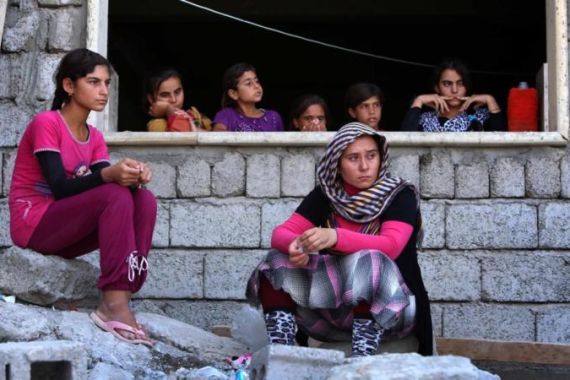US and genocide: Who gets bombed, who gets saved?
Invoking ‘genocide’ to validate US strikes on the Islamic State group cannot be morally justified af

Thank you for saving the day President Obama, all for the sake of preventing a genocide in Iraqi Kurdistan. Thousands of Yazidi Kurds roaming the Sinjar mountains have been waiting for your invaluable help for the last seven days: Scores of people have died of thirst and exhaustion because you took your time to react, but as they say, better late than never.
The Christians of Mosul who have been systematically victimised since well before the Islamic State group takeover of their city have also long been waiting for US help, and so have the populations of Syria and Darfur, who were never granted this privileged status granted by an impending “genocide“. Forget even about Rwanda: that would be below the belt.
Keep reading
list of 4 itemsBurkina Faso says HRW massacre accusations ‘baseless’
Iraq criminalises same-sex relationships with maximum 15 years in prison
The Abu Ghraib abuse scandal 20 years on: What redress for victims?
|
|
| US jets bomb the Islamic State group in Iraq |
So aren’t we all relieved that US drones and aircrafts have launched their hellfire missiles onto Islamic State positions approaching the sacred sanctuary of Erbil, the economically successfully new Dubai which hosts scores of NGOs, businesses, and of course, US army personnel?
I should actually be glad that these airstrikes took place. As I was relocating with my seven-year-old daughter from across the world to come and teach Peace and Conflict Studies at the University of Duhok, I was told to turn around and wait a few days until the situation improves, as if the Islamic State group is no more than a snow bank that the mighty US government will clean up after a nasty storm. So now I may relocate and force liberal peace studies down the throats of young gullible Kurds. Drones have cleared the way for me to come and justify your war crimes, in the name of peace and security. I am grateful since air strikes mean that I can keep my job.
Earlier in the year I visited Yemen, and witnessed the human toll and devastation caused by drone attacks on defenceless civilians. I spoke to families of victims, human rights organisations, and local activists. All associated your airstrikes with the rise of al-Qaeda in the Arabic Peninsula, since the scores of civilian casualties from the strikes actually boosted local support for the group. Will these airstrikes boost the moral position of the Islamic State fighters in some Sunni parts of Iraq? Will the US involvement in the conflict reinforce the anti-Arab sentiments already creeping through Iraqi Kurdistan?
Last summer, I visited Fallujah and its demonstrations, which tried to vindicate three simple political demands, one of which the Obama administration has since agreed to: the need for sectarian ruler Nuri al-Maliki to step down. No one from the international community bothered to listen to the Occupy Fallujah demands, which also included an end to sectarianism and an end of all talks of federalism. Instead, all sided with the Maliki regime when it used the spectre of “terrorism” to crack down on the demonstrations.
When Nuri al-Maliki decided to militarrily crush Anbar province last December, this left the Fallujah population with no choice but to eventually side with the Islamic State group. Since then, barrel bombs have been used against hospitals, schools, and civilian targets, all with impunity. No one talks of Maliki’s war crimes, yet laments the advance of the Islamic State group into Erbil.
The latest situation in Iraqi Kurdistan was made by the United States’ unfaltering support for the sectarian politics of Nuri al-Maliki, as well as by the United Nations Assistance Mission for Iraq, whose choice not to visit Anbar province (despite repeated invitations from Fallujah) before it was crushed appeared to the local population as a declaration of partiality. Though both now lament the current situation, the fact reamins that this makes them accessories to the alleged crimes committed recently by the Islamic State.
Sectarianism between Shia and Sunni Arabs was never as rampant in Iraq as it became after the invasion of the country. For the Kurds, however, discrimination, ethnic cleansing and genocide has been a reality since Saddam Hussein’s Anfal campaign in the 1980s, which was never recognised as a genocide by the international community.
No one can rejoice when airstrikes are being carried out by a superpower which is responsible for having created the situation in the first place. The US is not saving anyone but its own interests in Kurdistan. Had the Islamic State group not approached Erbil, it is likely no intervention would have taken place, and that the Yazidi displaced from Sinjar would be forced to eat tree leaves for another while, just like the population of Halabja who were not saved from Saddam’s weapons of mass destruction.
Victoria Fontan, Professor of Peace and Conflict Resolution Studies at the University of Duhok, in the Kurdish Region of Iraq; and also Doctoral Candidate in War Studies at King’s College London.
Follow her on Twitter: @DecolonizingPAX
